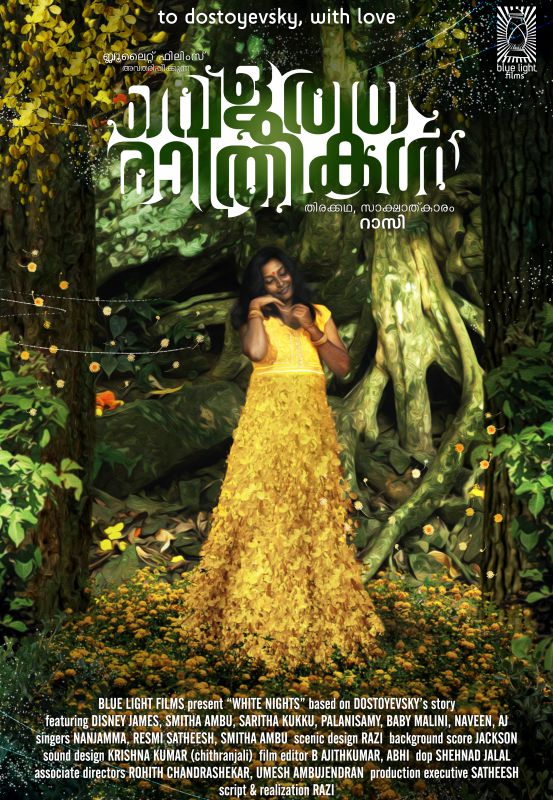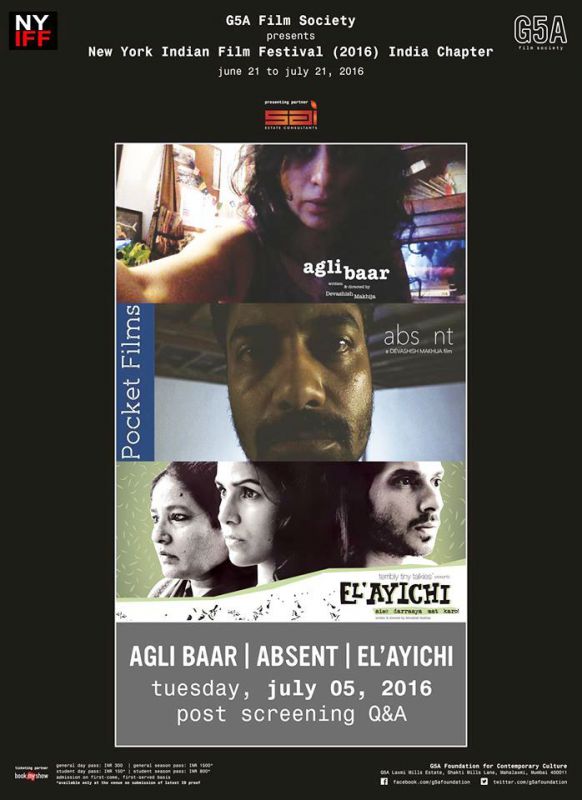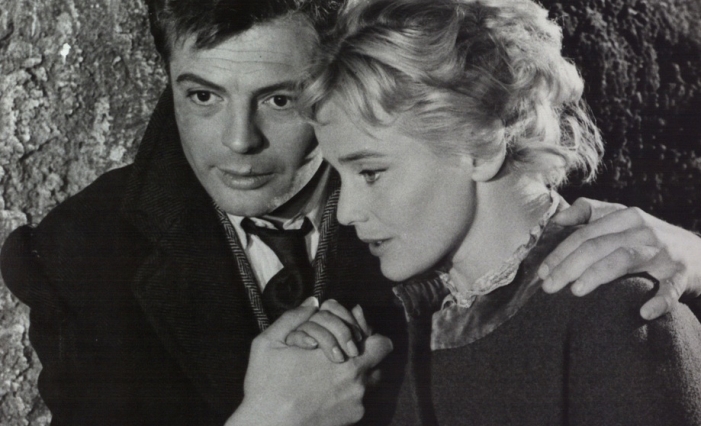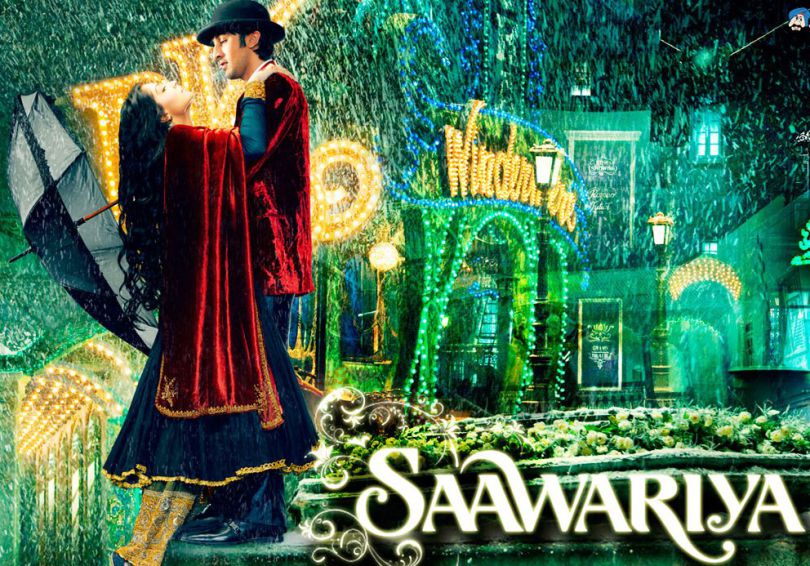|
|
||
|
Pro Tools
FILMFESTIVALS | 24/7 world wide coverageWelcome ! Enjoy the best of both worlds: Film & Festival News, exploring the best of the film festivals community. Launched in 1995, relentlessly connecting films to festivals, documenting and promoting festivals worldwide. Working on an upgrade soon. For collaboration, editorial contributions, or publicity, please send us an email here. User login |
Reviews, G5A-NYIFF screenings: Velutha Rathrikal (White Nights)
Reviews, G5A-NYIFF screenings: Velutha Rathrikal (White Nights) Inclement weather (read incessant rains) and no means of transport deprived me of the opportunity to catch-up on For the Love of a Man, screened on 28th June, as part of the G5A-NYIFF film festival, currently underway at the Foundation’s Black Box, located in a creatively designed facility in an erstwhile industrial estate, close to the iconic Famous Mahalaxmi studio and office complex. Earlier in the year, I had seen only the last few minutes of the well-made documentary on South Indian superstar Rajanikanth’s fans and fan clubs, when it was shown at the Mumbai International Film Festival (MIFF). Two days later, I made sure that I do not end up drenched and stranded around the screening time (7.30 pm), and was already at the venue when the clock showed 7.15, enough time to savour half a cup of hot tea before the show began. Lined up for the day was a long take on Fyodor Dostoyevsky’s short story, White Nights, all of 2 hours and 10 minutes, by Kerala-based director Razi Muhammed. At least two hours of the film were a treat for the eyes and ears, and it just fell short of attaining greatness by not much. A thousand images lingered in your mindscape as you emerged from the Black Box and walked into the black monsoon night. Velutha Rathrikal Velutha Rathrikal (White Nights) is an adaptation of the eponymous novel by Fyodor Dostoyevsky, with many, many liberties. Manu is an artist, a painter and sketcher, in search of a new world, from his troubled past, and lives in a forest settlement. He meets Chelly, a tribal girl from a nearby settlement, who bears the scars from her own share of life’s wounds. As she awaits the return of her beloved friend and lover, Jyothi, Manu gets closer to her. Despite their diverse upbringings, Manu and Chelly strike a serene and beautiful chord with each other. Their brief but intense encounter, reviving every at a canal bridge over five successive nights, juxtaposes harsh realities against captivating nature. Writer director Razi Muhammed went on to study at FTII in Pune, after his degree from College of Fine Arts, Thiruvananthapuram, and Masters, from the MS University, Baroda. He has been the production designer of numerous acclaimed Malayalam and Hindi films. Amidst his projects in films, Razi has exhibited his paintings and photographs at various solo and group shows, in India and Europe. Many of his works are with private collectors in India, Canada, UK, Belgium, and New Zealand. He also lectures as a guest faculty at various fine arts colleges, across Kerala. This film his is directorial debut.
Always obsessed with Dostoyevsky, he has reworked a pet subject in a manner that allows him to blend a host of elements together: glorious nature, seductive and sparingly used special effects, painting, sketching, folk music, discrimination against tribals, communal riots (set in Baroda, where he had studied, one of the weaker points of the narrative), the earthquake in Nepal, demonising of drug addicts and homosexuals/lesbians, platonic love v/s physical love, fleeting moments v/s permanence, marital violence, loss of loved ones, sexism in Indian society, solitude, betrayal, modernism v/s decadence (jeeps, laptops, mobile phones, a brilliantly captured art exhibition in the forest), community agriculture v/s destruction of flora and fauna. Shehnad Jalal, an alumnus of Satyajit Ray Film & Television Institute of India, Kolkata, is an award-winning cinematographer. His work in films such as Kanyaka Talkies (2013) and Chitrasutram (2010) has earned him plaudits. Cinematography is key to this project, and often the extension of the art and design by the auteur-director. By many yard-sticks, this is award-winning stuff too. On a couple of occasions, there are rapid cuts from dark nights to white sunlight, which are startling and even jarring, but obviously intentional. What were the director and editor (Ajith Kumar B.) trying to effect? Distancing of the audience? Dichotomy of night and day? Hope and despair? We can read many meanings. Disney James underplays Manu to perfection. A lecturer-turned-actor, he has been acting in films since 2010. Some notable appearances: @Andheri, Puthumukhangal Thevai, Memories, North 24 Kaatham, Jilebi, Ennum Eppozhum, Kunjiraamayanam, Ennu Ninte Moideen, Mutdhugavu and Adi Kapyare and Koottmani.
Smitha Ambu has the more complex role, effervescent at one moment, morose the next. But her joie de vivre, and survival against all odds, is admirably delineated. A stage and film actress, she completed her studies in Theatre from Ninasam, Karnataka, and works as a Theatre in Education instructor. Chitrasutram has been one of her acclaimed films. Her face is more square than round, complexion really dark and her body is on the heavy side. All these facets go well with the character. It does come as a surprise that she is the womanly partner in the couple, but her mate is more suave, better read and widely travelled. If one of them were to be able to let her feeling get the better of her, it would have to be Jyothi. Playing the college-mate, and later lover, of Chelly, Jyothi, is Saritha Kukku. Kerala State Film Award winner for Papillio Budha, she also acted in Ranipadhmini, Iyobinde Pusthagum and Ka Body Escape. Cast as a sympathiser who initiates Chelly into forbidden love, she faces a challenging task—to convince and yet not look cheap or titillating. Helped by some crisp and timely editing, the affair is maintained just within acceptable norms, considering the film is anything but a sex romp. Singer-actress Resmi Sateesh studied audiography at Satyajit Ray Film and Television Institute. Music training had begun when she was just five. Her travels exposed to the wide-ranging genres of music in India, and that opened doors to the various forms of music from all around the world too. She had the opportunity to visit many tribal hamlets in the forests, along with a group of friends, who recorded their songs, as part of their post-graduation studies. Besides Malayalam, she has sung in Hindi too (Khoobsoorat). It is a delight to hear her lead the music included in the film, usually as an integrated live performance. Rating: **** Trailer: https://youtu.be/TVYfbaw0L7k On Tuesday, 5th July, the G5A-NYIFF schedule lists three short films: July 05, 2016: Agli Baar; Absent; El'ayichi; Daaravtha.
Fyodor Dostoyevsky (also spelt Dostoevsky) Born in 1821 in Moscow, he lived much of his childhood distanced from his parents. In these formative years, he formed a close bond with his elder brother, Mikhail. They would spend many hours reading celebrated Russian author, Pushkin, by candlelight, in their family's comfortable suburban home. Poor Folk/Poor People his first novel, published in 1846, to warm critical response. Something of a literary figure at the age of twenty-five, Dostoevsky began attending the revolutionary discussion group that would result in his imprisonment, and the eventual mock execution. His sentence was commuted to four years in prison, and four years of army service. His prison experiences, as well as his life after prison, among the urban poor of Russia, would provide a vivid backdrop for much of his later work. Released from his imprisonment and service by 1858, he began a fourteen-year period of furious writing, in which he published many significant texts. Among these are: The House of the Dead (1862), Notes from the Underground (1864), Crime and Punishment (1866), The Idiot (1868), and Devils (1871). During this period, Dostoevsky's life was in upheaval, as he lost both his first wife and his brother. On February 15, 1867, he married his stenographer, Anna Grigorevna Snitkina, who would manage his affairs until his death, in 1881. Two months before he died, Dostoevsky completed the epilogue to The Brothers Karamazov (1880), which was published in serial form in the Russian Messenger. His funeral attracted thousands of citizens, as Russia mourned the death of a significant literary hero. (Excerpted from the biography written by Pauls Toutonghi, a former student of Tom Beyer's Russian Literature class at Middlebury College) Excerpt from the original White Nights, Russian title Belye Nochi "Listen, listen!" I interrupted her. "Forgive me if I tell you something else.... I tell you what, I can't help coming here to-morrow, I am a dreamer; I have so little real life that I look upon such moments as this now, as so rare, that I cannot help going over such moments again in my dreams. I shall be dreaming of you all night, a whole week, a whole year. I shall certainly come here to-morrow, just here to this place, just at the same hour, and I shall be happy remembering to-day. This place is dear to me already. I have already two or three such places in Petersburg. I once shed tears over memories ... like you.... Who knows, perhaps you were weeping ten minutes ago over some memory.... But, forgive me, I have forgotten myself again; perhaps you have once been particularly happy here...." "Very good," said the girl, "perhaps I will come here to-morrow, too, at ten o'clock. I see that I can't forbid you.... The fact is, I have to be here; don't imagine that I am making an appointment with you; I tell you beforehand that I have to be here on my own account. But ... well, I tell you straight out, I don't mind if you do come. To begin with, something unpleasant might happen as it did to-day, but never mind that.... In short, I should simply like to see you ... to say two words to you. Only, mind, you must not think the worse of me now! Don't think I make appointments so lightly.... I shouldn't make it except that.... But let that be my secret! Only a compact beforehand...." "A compact! Speak, tell me, tell me all beforehand; I agree to anything, I am ready for anything," I cried delighted. "I answer for myself, I will be obedient, respectful ... you know me...." "It's just because I do know you that I ask you to come to-morrow," said the girl, laughing. "I know you perfectly. But mind you will come on the condition, in the first place (only be good, do what I ask—you see, I speak frankly), you won't fall in love with me.... That's impossible, I assure you. I am ready for friendship; here's my hand.... But you mustn't fall in love with me, I beg you!" Earlier screen versions
Le Notti Bianche (The White Nights), 1957 Italian, B&W, Starring Maria Schell and Marcello Mastroianni. Directed and co-written by Luchino Visconti (1906-76), an aristocrat by birth-- Count don Luchino Visconti di Modrone--also directed Obsession, Rocco and His Brothers, The Leopard, The Damned and Death in Venice. A well-known Marxist, he was openly and gay.
Saawariya (The Dark Guy/Lover), 2007 Indian, Hindi, Colour, starring Ranbir Kapoor, Sonam Kapoor (first film for both), Salman Khan and Rani Mukerji Produced and directed by Sanjay Leela Bhansali. 03.07.2016 | Siraj Syed's blog Cat. : Independent
|
LinksThe Bulletin Board > The Bulletin Board Blog Following News Interview with EFM (Berlin) Director
Interview with IFTA Chairman (AFM)
Interview with Cannes Marche du Film Director
Filmfestivals.com dailies live coverage from > Live from India
Useful links for the indies: > Big files transfer
+ SUBSCRIBE to the weekly Newsletter Deals+ Special offers and discounts from filmfestivals.com Selected fun offers
> Bonus Casino
User imagesAbout Siraj Syed Syed Siraj Syed Siraj (Siraj Associates) Siraj Syed is a film-critic since 1970 and a Former President of the Freelance Film Journalists' Combine of India.He is the India Correspondent of FilmFestivals.com and a member of FIPRESCI, the international Federation of Film Critics, Munich, GermanySiraj Syed has contributed over 1,015 articles on cinema, international film festivals, conventions, exhibitions, etc., most recently, at IFFI (Goa), MIFF (Mumbai), MFF/MAMI (Mumbai) and CommunicAsia (Singapore). He often edits film festival daily bulletins.He is also an actor and a dubbing artiste. Further, he has been teaching media, acting and dubbing at over 30 institutes in India and Singapore, since 1984.View my profile Send me a message The EditorUser contributions |































